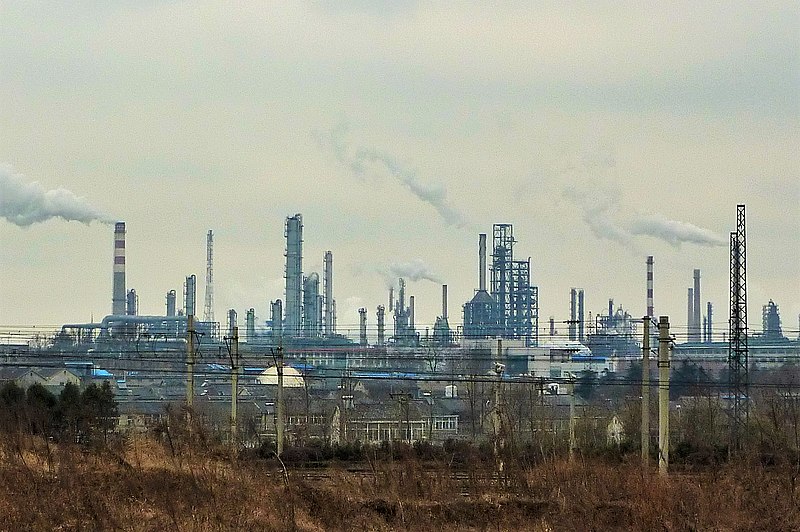
Are Rare Earths China’s Ultimate Weapon?
By F. William Engdahl
26 May 2019
Image Author: User:Vmenkov License:Creative Commons Attribution-Share Alike 3.0 Unported, 2.5 Generic, 2.0 Generic and 1.0 Generic license with restrictions https://bit.ly/2ExLUB0
In the dramatic escalation of tariff escalations and trade war tensions between China and the USA, China President Xi Jinping made a well-timed visit to see the JL Mag Rare-Earth Company Ltd., a state-owned complex in Ganzhou. Though he did not openly threaten, he sent a clear psychological message to Washington that China has more weapons in its arsenal to pressure the Trump Administration. What is the nature of the China role in rare earth minerals mining and how serious is the likelihood they could weaponize it ?
In a May 20 article the China government paper, Global Times, wrote of the Xi Jinping visit, “The visit [is] seen as a sign of backing from the top leadership for the domestic rare-earth industry.” They further noted not so subtly, “Many have suggested that China should limit rare-earth exports to the US as a countermeasure to the US decision to slap tariffs on Chinese goods and cut supplies of semiconductors for Chinese companies.” The paper makes a point to note that rare earth metals from China were “among the few items excluded from the latest US tariff list.”
The question is how serious would it impact the US economy were China to ban exports of rare earths to the USA? Short answer, very serious.
In addition to its use in most electronic devices such as smart phones or laptops, rare earth minerals are absolutely essential to the Pentagon and the US military forces. According to Breaking Defense newsletter, rare earth components are essential for such major weapons systems as the nuclear-powered SSN-774 Virginia-class fast attack submarine; the DDG-51 Aegis destroyer; the F-35 Joint Strike fighter among others. They note that “Rare earths are also essential to precision-guided munitions, lasers, satellite communications, radar, sonar and other military equipment, added a 2013 Congressional Research Service report.”
Import dependency
Now the next question is to what degree is the US economy, especially its defense industrial base dependent on imports of China rare earths? The answer is almost 100%. According to a December, 2017 report by the US Geological Survey, China today supplies more than 90% of world rare earths. This has been the case since the late 1990s when the Government of China prioritized its development of the vital minerals.
The rare earth elements group are generally denoted as 15 elements that range in atomic number from 57 (lanthanum) to 71 (lutetium), commonly referred to as the “lanthanides.” Some listings include Yttrium as well. The strongest magnets known, neodymium-iron-boron magnets, use rare earths, as do catalysts in petroleum refining.
In terms of known reserves, the USGS estimates that China has 55 million metric tons of REEs, most in Inner Mongolia. Global REE reserves are calculated at some 130 million metric tons led by, in decreasing order of reserves, China, Brazil, Australia, and India.
The Death of US Rare Earths
Most astonishing in the saga of rare earths today is the history of the United States as a major producer of REEs. Until 1995 the United States was the world’s largest producer of processed rare earths. According to the USGS, the US has approximately 13 million metric tons of rare earth elements, mainly in California, Alaska, and Wyoming and Texas.
The largest mining facility was Mountain Pass Mine in the Mojave Desert in California, owned by various interests, originally by Union Oil, later Chevron. Mountain Pass was forced to close over environmental spill charges in 2002 but after reorganizing, reopened in 2010 when a China rare earth embargo aimed at Japan forced world metals prices skyhigh. Japan’s Sumitomo participated in the upgrading of Mountain Pass. With the higher prices, by 2014 it was producing 4,700 tons of rare earths a year. However, when China ended its rare earth export ban in late 2014 and world supplies were abundant, prices collapsed and Mountain Pass owners, now Molycorp Minerals LLC, were forced to file for bankruptcy in 2015.
The full saga of the demise of the entire US rare earths mining and processing industry and the rise of China as world leader in merely a quarter century requires a separate treatment. A key part was played by the sale of another vital us rare earths company once owned by GM but sold to an investor group headed by Archibald Cox, jr, called Magnequench. Magnequench was then sold to a group of Chinese investors and its US facilities closed in 2000 and all equipment moved to China. In 1998, during the Clinton Presidency, astonishingly, a decision was also made to have the Pentagon sell its entire strategic reserve of rare earths. The same year, the last US producer of rare earth metals and alloys, Rhodia Incorporated, closed its processing facility in Texas and built a new one in Mongolia.
Ironically, Defense One journal notes that “even though American mining companies extract enough rare earth ore, through mining other metals, to meet 85% of global demand, it is discarded because the regulations make it uneconomic to mine.”
GAO Warning
In 2016 during the Obama Administration, the Congressional GAO issued a report on the state of rare earths. It warned, “rare earths are essential to the production, sustainment, and operation of US military equipment. Reliable access to the necessary material, regardless of the overall level of defense demand, is a bedrock requirement for DOD.” Obama Defense Secretary Ashton Carter failed to take any measures to address the vulnerability.
In one of his first acts as President, Donald Trump signed an Executive Order commissioning the most comprehensive inter-departmental government defense industrial base review. Shortly before the report was made public last December, Ellen Lord, Pentagon Undersecretary for Acquisition and Sustainment, said that once they looked in detail at the reliance the American defense industry has placed on China for critical minerals, the results were “quite alarming…we have an amazing amount of dependency on China. They are sole sources for rare earth minerals, some energetics, different things. This is a problem for us as we move forward.”
The problem is that it takes years to rebuild sophisticated mining and rare earth processing facilities, let alone to recruit the engineers and others essential to it. Unless the Pentagon has been quietly stockpiling rare earths, a declaration of China rare earth export embargo would be a huge strategic escalation. However, it would have huge consequences as well for China in an escalation that quickly could get out of control. At this point a China rare earth ban remains an unspoken threat only. One can hope it remains so for the sake of world peace.
F. William Engdahl is strategic risk consultant and lecturer, he holds a degree in politics from Princeton University and is a best-selling author on oil and geopolitics, exclusively for the online magazine “New Eastern Outlook”
